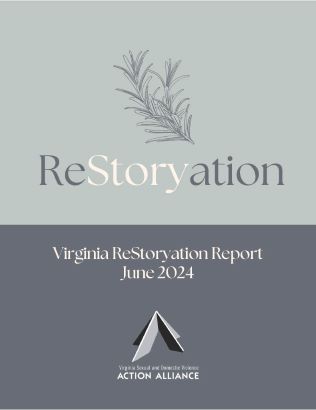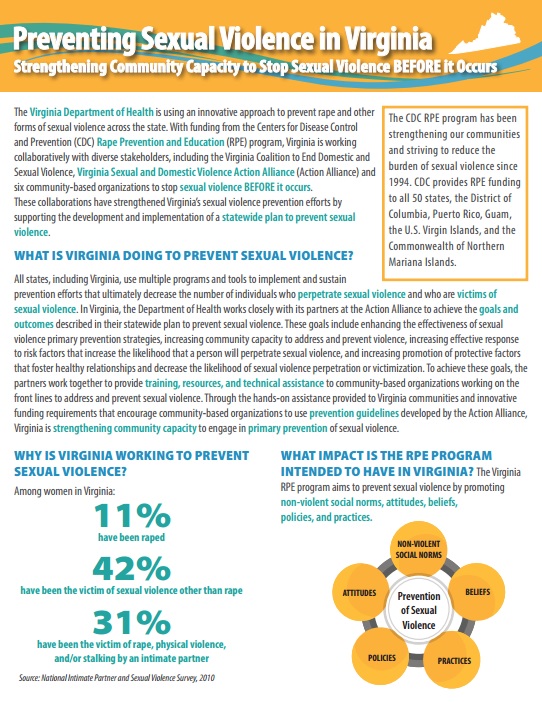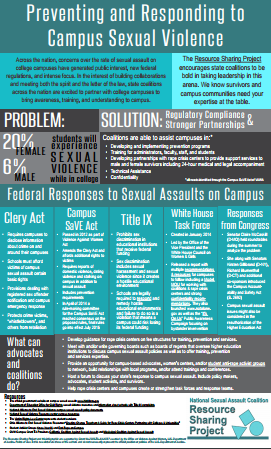Resources Library:
Start a Search:
ReStoryation Virginia Statewide Report 2024

Stories reveal, help us process, and reflect. Story circles have been part of our collective human experience across communities, cultures, and generations. The process of storytelling and the practice of bearing witness to one another’s stories is one of the most intuitive, most powerful, and most ancient medicines we have.
Virginia was one of 25 states and territories across the U.S. to participate in Restoryation, a national storytelling project and needs assessment among professionals working in the movement to end sexual and domestic violence. The primary goals of Restoryation were to employ storytelling to:
- Pause and reflect on the impact of the previous 3 years on ourselves and our work.
- Provide an opportunity for connection and healing through sharing our experiences and bearing witness to each other’s stories.
- Name what is needed to create a thriving workforce and movement going forward.
This report describes the process and findings from the Restoryation story circles held February-May 2023, and includes recommendations for continuing efforts to support sustainability among the workforce of personnel working in sexual and domestic violence programs.
RPE Stories from the Field

With funding from the Centers for Disease Control and Prevention (CDC) Rape Prevention and Education (RPE) program, all 50 states, the District of Columbia, Puerto Rico, Guam, the U.S. Virgin Islands and the Commonwealth of Northern Mariana Islands are working across the country to implement a comprehensive set of activities to stop sexual violence BEFORE it occurs.
Using a storytelling approach and colorful infographics, the Stories from the Field provide a unique way to communicate the important work of state RPE programs and the benefit to their respective communities. The 20 Stories from the Field represent a sample of the critical efforts underway across the country to prevent sexual violence.
Click here for other state and territories.
RSP Preventing and Responding to Campus SA Infographic

In this ReShape, the Resource Sharing Project created an infographic for coalitions about federal rules and regulations around campus sexual assault.
Rural and Tribal Elder Justice Resource Guide: Summit Event Briefing
Summit Event Briefing
November 14-15, 2018
Marriott Downtown 700 Grand Ave.
Des Moines, Iowa
On June 15, 2018, the United States Department of Justice and Department of Agriculture committed to working together to promote elder justice in rural and tribal communities. Elder justice refers to a society’s response to elder abuse, which includes physical abuse, caregiver neglect, financial exploitation, psychological abuse, sexual abuse, and abandonment. Each year in America, at least 10% of older adults (age 60 or older) experience one or more forms of elder abuse. This is unacceptable.
The goal of the Summit and subsequent activities is to enhance the ability of elder justice professionals to more robustly respond to the unique needs of older adults residing in rural and tribal communities by sharing best practices and proposing innovative strategies to fill the identified gaps in service needs, all with the goal of enhancing the lives of older Americans everywhere.
SAFE RETURN: Working Toward Preventing Domestic Violence When Men Return from Prison
The Safe Return Initiative focuses on strengthening domestic violence services for African American women and their children when they are facing the return of an intimate partner from prison. It does this by building culturally specific technical capacity within and cooperation among justice institutions and community-based and faith-based organizations. Its goals are to keep women and their children safe and improve the odds of successful reentry by offering peer-based learning, training, information sharing, and on-site assistance designed to help criminal justice and community-based
organizations better serve African Americans dealing with prisoner reentry.

